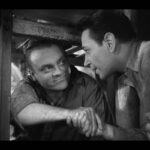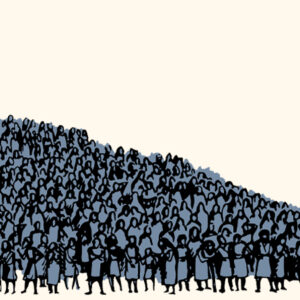
Whitney Terrell on 9/11, Panic Attacks, and the Long Road to His New Novel
How The Good Lieutenant Almost Never Was
In 2012, the novelist Whitney Terrell was standing on an impeccably tended lawn at a July 4th party at an exclusive country club in his native Kansas City, a place from his childhood where he had planned never to return.
In the early aughts, Terrell had written two acclaimed novels on 1950s and 60s racism and segregation in Kansas City, The Huntsman and The King of Kings County. His third novel, about a woman army lieutenant seeing combat in Iraq, was going very badly. Terrell had stopped writing and was having panic attacks over the work.
“My kids were running on this golf course lawn,” said Terrell, in a telephone interview from his home in Kansas City. “All the people I had grown up with were there, being friendly. I had this thought, ‘Oh my God, I made a mistake. I left the bubble,’” he said of the white social and economic elite of Kansas City that he had been born into. “I shouldn’t have left the bubble. Maybe I won’t be able to pay for my sons’ education.’ I was thinking of becoming a real estate agent.”
“I’d spent my life excoriating that very world,” said Terrell. “I wrote two novels that explained what was so soul-killing and corrupt about that world. I hated it. So to want to go back was like wishing to die. Or wishing to have a lobotomy. I was lost.”
Seven years into the writing of his Iraq novel, Terrell, a writing professor at the University of Missouri Kansas City, was in a literary quagmire. His old publisher had turned his novel down, and he did not know how to fix it.
Now with a new publisher, an innovative editor, a lot of aggressive rewriting and a radical change to the structure—telling the story backwards—Terrell has just published The Good Lieutenant, the Iraq War story of Lt. Emma Fowler. Fowler tries to keep her unit together and carry out her mission in a war based on lies and plagued by catastrophic military decisions.
Terrell has taken a stark departure from his Kansas City novels by writing about Fowler and her platoon, a recovery unit retrieving blown up vehicles and dead soldiers in Iraq during the dark days of high American casualties in 2006.
The intense novel begins with a bang, when a section of Fowler’s unit is blown up by an IED while trying to retrieve the body of the unit’s kidnapped and murdered platoon sergeant outside Baghdad. Then going in reverse chronological order, the novel strips back the layers of the story. The book goes to a bombing of an intersection in Baghdad where soldiers were killed due to decisions made by an incompetent colonel, and then to the tumultuous deployment of Fowler’s unit from Kansas to Iraq.
Terrell was working on his second novel in 2003 when President George W. Bush and Congress were barreling into an ill-planned invasion of Iraq.
“When I was working on The King of Kings County, we were starting a war in Iraq,” said the 48-year-old Terrell. “I was not in favor of the invasion.”
“I knew I wanted to look forward, to say something about this war, because it was going to linger in our culture for a long time,” said Terrell, who has the affable demeanor of a class president who talks to both jocks and geeks. “The only way for me to work out my feelings on an issue was to write a novel about it.”
Terrell graduated from Princeton, where he studied with John McPhee. He also received his MFA from the Iowa Writers Workshop, where he worked with the short-story writer James A. McPherson.
In 2005, Terrell wrote an investigative piece for Details about American soldiers jailed for shooting Iraqi civilians. To research the war, he made plans to embed himself with American troops as a freelancer with the Washington Post.
“I was thinking about Emma Fowler before I ever went to Iraq,” said Terrell, of his fictional Army lieutenant, who joined the military to escape a fractured family life in Kansas. “The central core of Emma was there from the beginning.”
Before Terrell went to Iraq, he started having panic attacks.
“I started having these anxiety attacks,” said Terrell. “I don’t want to emphasize this, for real soldiers who do dangerous things have these attacks. I had a son who was recently born, and there had been a journalist blown up in the area I was going to in Iraq. In the summer of 2006, if you went outside the wire, you risked being hit with an IED. It was a roll of the dice. I thought, ‘What right do I have to risk my life? I have a wife and son. I should be writing about suburban Kansas City. Why are you egotistical enough to think you can comment on the war?’”
The panic attacks subsided once Terrell got to Iraq, where he met tough women officers, like Jennifer McDonough. “She was a captain, who had a job similar to Emma Fowler’s, attached to an infantry battalion, running a recovery unit,” he said.
When Terrell returned to the U.S., he started writing the novel in earnest. One of the earliest scenes he wrote is of an eight-year-old Fowler being lectured by her mother, just before she abandons the family, leaving Emma to raise her younger brother. Terrell saw it as a parable for the Iraq War, how America’s policymakers were handing the terrible cost of the war and their screw ups to its young soldiers.
“I wrote this scene very early,” said Terrell. “The mother is saying, ‘You are supposed to be good, you can’t be bad like me.’ It took me eight years to fully understand what the scene meant, but it was the original lightning strike on who Emma Fowler was. It was like the older generation saying to the young soldiers in Iraq, ‘We’ve screwed up a bit. We’ve been bad, but you have to be good.’”
The Iraq War presented new issues for fiction writers. “When I started writing, this was before veterans like Phil Klay wrote about their experiences. There was no template for an Iraq War novel,” he said.
“The protagonists in Vietnam War novels are people who had been drafted,” said Terrell. “You have a character who is set off from the group and therefore a critic of the group, and isn’t morally culpable for what is happening in the narrative.”
“In the Iraq War, everybody volunteered, so that the Vietnam character of the draftee doesn’t exist,” said Terrell. “Everybody to some extent is involved in what is happening and committed to what is happening in the war. This creates a new set of circumstances that American writers have not dealt with before.”
Terrell recently taught a modern war literature class to his MFA students, using Ferdinand Celine, Thomas Pynchon’s Gravity’s Rainbow, and James Jones, author of The Thin Red Line. “James Jones was one of the writers I learned the most from,” he said.
For Terrell, Emma Fowler became his necessary outsider. “From the beginning, I thought it would be great to write about a female soldier. What makes Emma useful is that she is offset from the system. It gives her the perspective that is different than other soldiers.”
Terrell put Fowler in a love affair with Lt. Dixon Pulowski, a cynical signals officer attached to her unit. “For Emma, the Army is orderly; there is a chain of command,” said Terrell. “Pulowski is more canny, and teaches her that the Army works like the real world works and is messy.”
In 2011, Terrell turned in a draft of The Good Lieutenant to Viking, the publisher of his Kansas City novels. The house wasn’t interested.
“I didn’t have a contract with them,” said Terrell. “When I turned in the original forward-moving draft, the word was that Iraq books don’t sell, there is not a market for this. It might have been a nice thing to say, but the novel was not all there.”
Terrell’s novel was stalled, like the actual Iraq War had been. And then the panic attacks that had struck him before he went to Iraq came back.
“Once the book started going south in the middle of writing it, those anxious feelings came right back,” said Terrell. “I’d work all day in a panic: ‘If I can’t write this novel, my whole world would fall apart.’
“Panic attacks are a real thing. Very intense,” said Terrell. “I come from a family where you don’t go to therapy; you say a prayer and move forward. Fortunately, my wife comes from San Francisco, and has a different kind of family. She said, ‘You need to go to a therapist right now.’ In 2012, I talked to a therapist and took some medication. It was extremely helpful.”
Terrell realized he needed a good editor. His agent sent out the manuscript. Sean McDonald of Farrar, Straus and Giroux expressed an interest. McDonald is famous for the work he did with Aleksandar Hemon, George Saunders and the satirist John Hodgman, as well as the controversial memoirist James Frey.
Working with McDonald, Terrell came up with the reverse chronology of the novel. “I came up with the backward structure out of necessity,” said Terrell. “When Sean read the first draft of the book, he said, ‘You need to get to the last 150 pages sooner.’”
“I accidentally reversed two of the chapters and I realized that if I told the story backward, it would allow the novel to open up in different ways,” said Terrell. “If I took the combat from the climactic position in the book and put it first, it would allow me to explore other things, like Emma and Pulowski’s relationship.”
Pulowski is able to help guide Fowler through the political snakepit of the Army. “Emma’s learning curve is aided by Pulowski,” said Terrell. “He teaches her to be more pessimistic, more cunning, more skeptical. She fights these ideas, but learns from them. Their partnership makes her a good lieutenant.”
Because of her youth and gender, Emma finds herself challenged by the cruel Captain Masterson, an infantry officer who steals her supplies back in Kansas when they are about to deploy, and takes her platoon sergeant Beale and brutally scapegoats him, making an enemy his men can appreciate. Emma is forced to exact revenge while protecting her sergeant.
“The theft of supplies came from real events one of the women officers told me about,” said Terrell. “One of the things I wanted to do with Masterson was show that he was not Kurtz (from Heart of Darkness). You don’t have to be someone with access to the dark hearts of human souls to be a real problem. Masterson is a relatively simple guy, and Masterson’s arguments for the need for an enemy are relatively simple, but he’s the cause of all the trouble.”
The Terrells have been in Kansas City since the 1890s. Writing the two Kansas City novels on race and segregation, Terrell had to dig into the underbelly of the city history and to look at the decisions that the powerbrokers and elites, men of his social class, had made that screwed over the city’s black population while gutting the vibrant downtown through white flight. The novels took a psychic toll on him.
“When you start writing about the racial and economic history of Kansas City and look at the role that the white elite played in the segregation of the city, you recognize that your entire young life in the city that you live in is tainted and corrupt, not a thing you can really visit in the way that most people visit their past. Instead it is off limits.” For Terrell, this included the exclusive country clubs and hunt clubs that the Terrell family had belonged to for generations.
“You can’t think about it naively anymore,” said Terrell. “It changes the way you live in the city. It’s sad. You can’t go to those places anymore. You have to forge a new life for yourself.”
At the end of the novel, Lt. Emma Fowler and her unit have paid a horrible price and Fowler’s moral certainties have been beaten up. But she will defend her men, and she’s ready for all enemies, be they Iraqi insurgents or the Army officers ranked above her.
“Iraq is a place where good people can make good decisions and still have bad results,” said Terrell. “Wars based on false premises and lies at the beginning means that these lies will filter down to the good people fighting the war. It will affect them. We saw it in Vietnam and we saw it in Iraq. The backward structure of the novel forces you to reckon with these choices.”
During the hard years writing The Good Lieutenant, Terrell thought of leaving Kansas City, especially when he had a fellowship at Princeton in 2008. “I desperately wanted to leave Kansas City,” he said. “I always thought the East Coast would be the right place for me. I think that people always have an imaginary place that things will be better.
“The writing of this book was the process of me learning that I didn’t want to leave Kansas City,” said Terrell. “When I was struggling with the novel, I learned that I had a community at the university that supported me, as well as my friends and other writers in town. I have a special thing here and I wouldn’t be able to recreate this elsewhere.”
Kansas City is booming. The gutted downtown that Terrell wrote about in The King of Kings of County is regenerating, with a new stadium and economic investment. “If I left, I would have missed the best ten years that Kansas City has had in my lifetime,” said Terrell. “The city is thriving. I couldn’t be happier.”
Terrell’s first book The Huntsman came out in September 2001, a few days before the September 11th terrorist attack on the World Trade center. The book party on the evening of September 9th in New York City was in an apartment overlooking Riverside Drive. The setting sun gave the rooms an orange glow. The party was packed and Terrell had felt the possibility of unlimited literary potential.
On September 11th, the Twin Towers were destroyed by Islamic terrorists, killing almost 2,800 New Yorkers, including cops, firefighters, bond traders, and secretaries.
The Huntsman was almost buried in the avalanche of news and features on the horrific aftermath of Sept. 11th and the drumbeats of the war in Afghanistan, though the book was able to recover and sold copies. It became a New York Times’ Notable Book.
America’s new political climate in the age of terrorism and wartime footing in Iraq and Afghanistan after Sept. 11th became part of Terrell’s long road to The Good Lieutenant. “I found myself wanting to understand what happened,” said Terrell. “We had entered a new world that morning. If you want to look at the long arc of the new book, you can start there.”
Feature image: screenshot via the Kansas City Star.
Dylan Foley
Dylan Foley is a freelance writer in Brooklyn, NY.



















